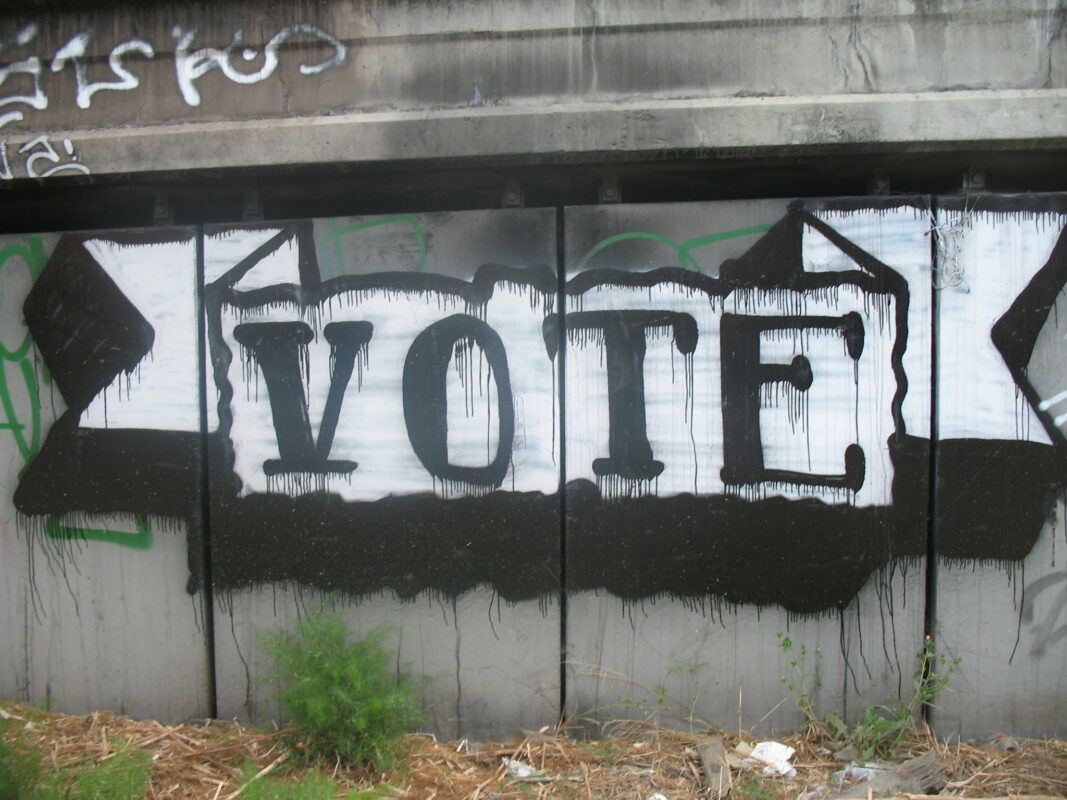The number of registered voters who believe the country is now headed in the “right direction” has fallen to an excessively dismal 10%, according to Civiqs tracking of the issue. Analysts have regularly cited the right/wrong track data as evidence that Democrats—and Democrats alone—are in deep trouble in November since the party that controls the White House usually gets blamed for such excessive pessimism.
But even a cursory look at the graph shows that the share of registered voters who say the country is heading in the “wrong direction” jumped roughly 10 points, from about 72% to 82%, right after the Supreme Court ruling gutting Americans’ constitutional rights to abortion.
As veteran pollster Paul Maslin recently observed on That Trippi Show podcast, “Everybody in this country has a reason to be upset about something—everybody does. Everybody has somebody that they’re afraid of or angry at, that is somehow afflicting them so that they think things don’t work.”
Sure enough—the number of Democrats who say the country is heading in the wrong direction in Civiqs jumped nearly 20 points following the Dobbs decision eviscerating Roe, from about 44% to 62%.
Likewise, the number of independents who told Civiqs the country is headed in the wrong direction jumped 8 points since the ruling, from 80% to 88%.
Maslin said he just finished conducting a poll in a state he declined to name in which the “right direction” numbers sat at just 8%.
“We’re in a very different paradigm,” Maslin noted. “Everybody’s mad about something. It may come down this November to which side is more fearful of the other. And what it would mean for the other to either retain power or to gain power. And that may end up becoming the key factor, and I think a reasonable person would have to say right now that’s a really close call. It’s not definitive at all that it’s the Republicans or the conservatives that are the ones that are going to be the most upset.”
Anecdotal evidence shows how this unique “wrong direction” dynamic could backfire on Republicans in a way that most pundits never imagined.
The New York Times, reporting on how abortion rights could keep moderate women in the Democrats’ camp this fall, profiles Alisha Meneely in Grand Rapids, Michigan, where Democratic Gov. Gretchen Whitmer was about to conduct a roundtable discussion at a brewery.
Meneely, who voted Trump in 2016 and Biden in 2020, has found President Biden’s leadership wanting but was simultaneously frightened of GOP extremism, which she said “scares [her] a lot.”
Meneely said that just before the Supreme Court overturned Roe v. Wade. After the ruling came down and the GOP feeding frenzy unleashed the party’s most radical impulses, the self-identified “pro-choice Republican” told the Times in a follow-up interview, “This is not my party.”
Anguished voters like Meneely are exactly why House Democrats have settled on a strategy of branding Republican candidates as extremists.
The Times article questioned whether the overturning of Roe could supersede inflation as a motivating factor for voters this fall—a question that truly no one can predict. But new reporting by Times’ Katie Glueck clearly shows why Democrats should press the case. Glueck talked to a cross-section of voters in suburban Bucks County, Pennsylvania, a critical swing county within a highly important swing state.
A 22-year-old Catholic and registered Republican said she was torn, but planned to vote for Democrats this fall based on abortion rights.
“As someone who knows other women who have had to make the decision to choose, it’s a very personal and very intimate decision,” Sophia Carroll, noting how radical Justice Clarence Thomas’ concurring opinion was. “Are they going to ban birth control next?”
Another voter, Diane Jacobs, 57, said the economy would be “the biggest thing” for her. Jacobs, who voted for Biden in 2020, said she believed abortion should be legal—despite being personally pro-life. Still, she pegged inflation as the driving force behind her intention to vote Republican.
But the interview also offered evidence for why Democrats need to keep highlighting GOP extremism.
Jacobs hadn’t heard about Pennsylvania Republicans who wanted to criminalize abortion entirely—the exact position of GOP gubernatorial nominee, state Sen. Doug Mastriano.
“If there was a presidential candidate who said they wanted to outlaw it in every single case, I don’t know that I’d vote for that person,” she said. “That’s pretty extreme.”
One June Pennsylvania poll conducted before the abortion ruling came down showed that female voters in the state viewed abortion as the No. 1 issue in the Senate race but the No. 3 issue in the gubernatorial race (behind the economy and gun control).
The survey’s data suggested that many pro-abortion rights voters perhaps hadn’t thought through the fact that electing a Republican governor would likely lead to a total abortion ban in the Keystone State.
And then there was a voter like 58-year-old Barrie Holstein, who said the ruling had lit a fire under her. She indicated she’s usually open to candidates from either party and sometimes skips the midterms but planned to back candidates this fall who would support abortion rights and gun control.
“I’m not political,” she said. “But it’s enough. I’m pissed. I’m pissed about gun control and I’m pissed about abortion. I really am.”
For months, pundits have assumed that data such as Biden’s flagging approvals, the country’s right track/wrong track numbers, and inflation would unquestionably lead to a very strong election cycle for Republicans. They entirely discounted the effects that extremist GOP candidates and the impending abortion ruling would have on the midterm—if they weighed them at all.
But any pundit or journalist who approaches the midterms as a foregone conclusion moving forward is either woefully uninformed or intentionally selling partisan BS.
Bottom line: This post-Roe, post-coup election is unprecedented and all bets are off.
